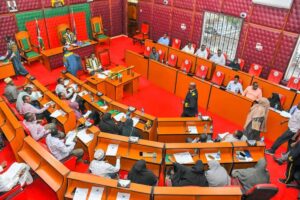After Fuel Kenyans to Suffer More As Electricity Costs Also Rise

Shoppers buying food stuffs at Naivas supermarket in Nairobi on December 31, 2019. Inflation raised for a fourth consecutive month to close the year at 5.82 percent in December. This is up from 5.56 percent in November, 4.95percent in October and 3.83percent in September, which was the lowest rate in 2019. The Kenya National Bureau of Statistics (KNBS) attributes the increase to rise in prices of some food and non-alcoholic drinks. Inflation measures the cost of living. Photo | Jeff Angote | Nation
The energy regulator has made a U-turn and increased electricity prices by 15.7 percent, reversing the January cuts by the former President Uhuru Kenyatta administration, in what has handed consumers a twin blow in the wake of higher fuel prices.
The Energy and Petroleum Regulatory Authority (Epra) also quietly hiked pass-through costs last week, including fuel, forex and inflation adjustments, pushing the cost of a kilowatt hour unit to Sh25.3 for domestic consumers who use more than 100 units a month.
This means that with Sh1,000, consumers on the over 100kWh tariff would now get 39.5 units of power, down from the 45.7 before the review.
The heavier consumers and industries will see their power costs rise even higher since the pass-through costs now account for more than a third of power bills.
Epra increased fuel cost charge (FCC) to a historic high of Sh6.7 from Sh4.6 last month, translating to a 43 percent jump, setting consumers up for the highest cost of power since December last year.
Loading…
The FCC is the single-biggest variable cost that is adjusted monthly and is collected by Kenya Power on behalf of the expensive thermal power generators.
The regulator has also almost doubled the forex charge from Sh0.7 to Sh1.3 — a high last seen in January 2021, reflecting the impact of the shilling decline on power bills — and adjusted the pricing to higher inflation of Sh0.67.
A rise in the fuel and currency surcharge increases the cost of power by reducing the number of units consumers get for a similar amount of money.
The record-high fuel surcharge comes at a time when the government and the International Monetary Fund (IMF) have agreed to end the fuel subsidies that have been cushioning consumers.
President William Ruto indicated on Tuesday he will imminently drop the fuel subsidy, setting up Kenyans for higher transportation and production costs.





